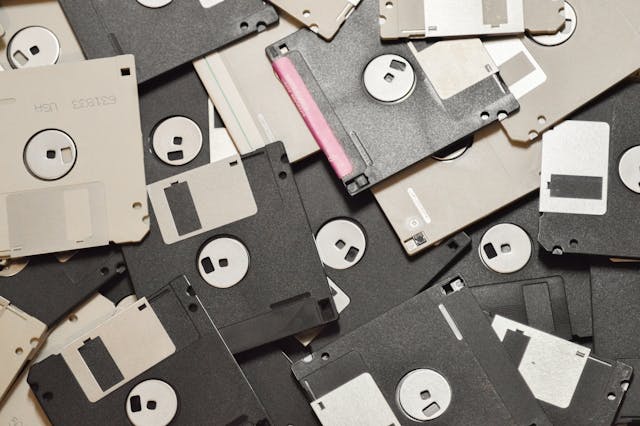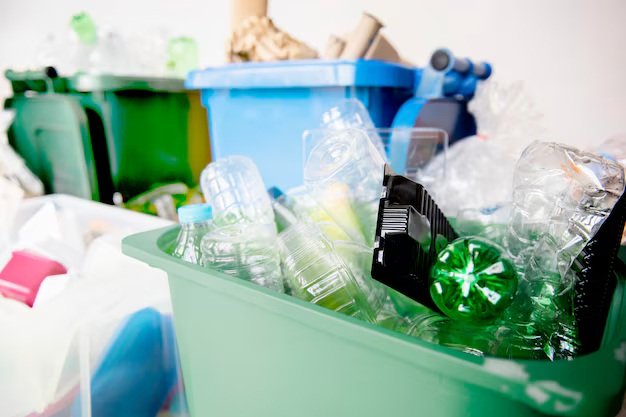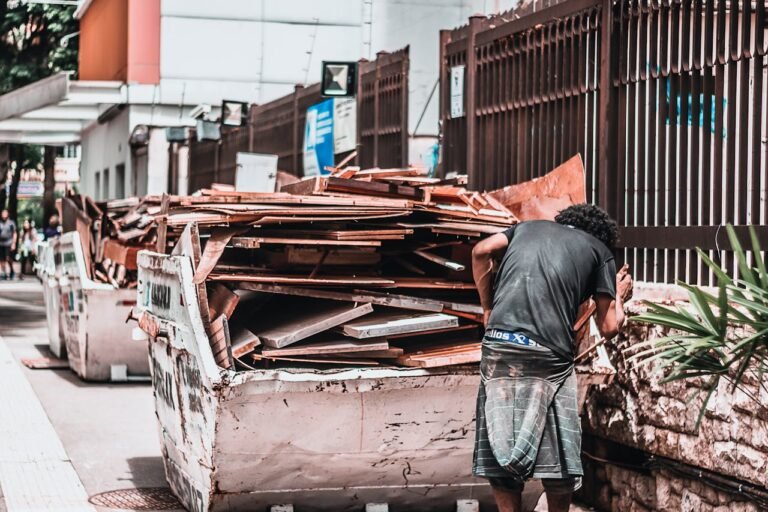How to Recycle Floppy Disks: A Comprehensive Guide For Reducing E-Waste
If you’ve ever sorted through old office supplies or cleaned out a long-forgotten drawer, you’ve probably come across something we all recognise but no longer use: floppy disks. Once a staple of computer storage, floppy disks have now been replaced by USB drives, cloud storage, and more modern data solutions. So, what should you do with all those old floppy disks that are collecting dust?
You might be tempted to throw them in the trash. After all, they’re outdated, right? But as I learned through personal experience, this seemingly small act can have significant environmental consequences. Floppy disks, like many electronic devices, contribute to the growing global problem of e-waste, and when improperly disposed of, they can sit in landfills for hundreds of years.
This guide doesn’t just explain how to recycle floppy disks; it dives into why it’s so important, sharing insights from my own experiences, as well as expert studies on e-waste management. Along the way, I’ll share practical advice on how to safely recycle these outdated devices and why doing so is critical for the health of our environment.

In This Article
- My First Encounter with Floppy Disk Recycling: An Eye-Opening Experience
- What Are Floppy Disks Made Of?
- The Growing Problem of E-Waste
- My Journey to E-Waste Awareness
- How to Recycle Floppy Disks Properly
- Expert Insights on E-Waste and Floppy Disk Recycling
- What Happens to Recycled Floppy Disks?
- Floppy Disk Recycling Success Stories
- The Future of Floppy Disk Recycling
- Personal Reflections and Final Thoughts
- Conclusion: Take Action Today
My First Encounter with Floppy Disk Recycling: An Eye-Opening Experience
I’ll never forget the time I first realised I had a pile of floppy disks gathering dust. I was moving houses and came across a shoebox filled with them in the back of my closet. They were relics from my college days—assignments, old projects, saved games—and though I hadn’t touched them in years, I was reluctant to just throw them away.
So, I did what many of us probably do when we’re faced with outdated tech: I ignored them, hoping they’d somehow take care of themselves. But after a bit of research, I discovered that simply tossing these disks in the trash wasn’t just irresponsible—it was harmful. The plastics and metals in floppy disks don’t biodegrade, and the materials used to make them are part of the broader issue of e-waste pollution.
That’s when I began my journey to learn about proper disposal methods and the importance of recycling floppy disks. And today, I’m sharing that knowledge with you.
What Are Floppy Disks Made Of?
Floppy disks might seem like simple pieces of outdated technology, but they’re made up of several different materials, each with its own environmental impact. Here’s a breakdown of what’s inside a typical floppy disk:
- Plastic Housing: The outer shell of a floppy disk is made of rigid plastic, a material notorious for its inability to decompose quickly. Plastics can take anywhere from 20 to 500 years to break down, and during that time, they release harmful chemicals into the soil and water.
- Magnetic Film: The disk itself, the part that holds the data, is made of a thin layer of magnetic material, often coated with iron oxide or a similar compound. While it doesn’t contain the heavy metals found in some e-waste, it’s still not something that should end up in a landfill.
- Metal Parts: Depending on the type of floppy disk, there may also be small metal components, such as the sliding cover on 3.5-inch disks. These metals can corrode and leach into the environment, posing risks to both wildlife and humans.
Learn more: 10 Eco-Friendly Appliances You Need in Your Home
The Growing Problem of E-Waste
Before diving into how to recycle floppy disks, it’s important to understand the bigger picture of electronic waste, or e-waste. According to the Global E-Waste Monitor, the world generated 53.6 million metric tons of e-waste in 2019, and this number continues to rise as technology advances and devices become obsolete faster than ever.
Floppy disks might seem small and insignificant in comparison to items like old computers or smartphones, but when you consider how many millions of these disks were produced, their environmental impact becomes clear. And because they aren’t commonly accepted in standard recycling programs, floppy disks often end up in landfills, where they contribute to the growing e-waste crisis.
The reality is that e-waste poses a significant threat to our planet. When electronics end up in landfills, toxic materials like lead, mercury, and cadmium can leach into the soil and groundwater, causing long-term environmental damage. Recycling your floppy disks, along with other electronics, helps reduce this problem.
My Journey to E-Waste Awareness
For years, I had no idea what to do with my growing collection of old floppy disks. But as I became more aware of the environmental issues surrounding e-waste, I realised that I couldn’t just ignore the problem. It was during a local recycling event that I finally took action.
I had gathered up a bunch of old electronics to drop off at the event—old phones, chargers, cables, and, of course, my floppy disks. I’ll admit I wasn’t sure if they’d even accept them. But the volunteers at the event were incredibly helpful, explaining the importance of recycling all types of e-waste, no matter how small. They also directed me to a company that specialises in floppy disk recycling, and that’s when I really started to appreciate just how important this process is.
From that day forward, I’ve made it a priority to educate others about the impact of e-waste and how they can take small steps—like recycling their floppy disks—to make a big difference.
How to Recycle Floppy Disks Properly
Now that you know why it’s so important to recycle floppy disks, let’s talk about how to do it. Based on my experience and research, here are several methods you can use to recycle your old disks responsibly:
1. Specialised E-Waste Recyclers
Not all recycling centres are equipped to handle e-waste, and even fewer accept floppy disks. However, there are several companies that specialise in recycling outdated media like floppy disks. GreenDisk and FloppyDisk.com are two of the most well-known companies that accept floppy disks via mail for recycling.
- GreenDisk is a company that focuses on recycling “technotrash,” including floppy disks, CDs, DVDs, and other forms of outdated media. They accept both 3.5-inch and 5.25-inch floppy disks and ensure that all materials are recycled in an environmentally responsible way.
- FloppyDisk.com, based in California, offers to buy large quantities of floppy disks (typically over 200 units) and recycle them. It’s a great option if you have a significant number of disks sitting around and want to get rid of them all at once.
Both companies charge a small fee to cover the cost of shipping and processing, but it’s a worthwhile investment in reducing your environmental footprint.
Learn more: Best Eco-Friendly Ways to Travel Sustainably in 2024: Expert Tips and Studies
2. Local E-Waste Recycling Events
Many cities host regular e-waste recycling events where residents can drop off items like old electronics, batteries, and other hazardous materials. While floppy disks aren’t always listed as a specific category, it’s worth calling ahead to see if they’ll accept them. If not, the staff at these events are often knowledgeable and can point you in the direction of other local recycling options.
Tip: I’ve attended several of these events, and I’ve found it helpful to keep a dedicated box for e-waste in my garage. That way, when an event rolls around, I have everything ready to go.
3. Reuse or Repurpose
If you’re the creative type, consider reusing or repurposing your floppy disks before recycling them. Floppy disks have become something of a retro novelty, and people have found all kinds of clever ways to give them a second life. From turning them into notebooks, coasters, or even clocks, there’s no shortage of DIY projects that can help keep these disks out of landfills for a little while longer.
I personally tried making a pen holder out of a few 3.5-inch floppy disks. It was a fun project and a great conversation starter in my home office!
Expert Insights on E-Waste and Floppy Disk Recycling
To gain a deeper understanding of the importance of e-waste recycling, it is important to study expert insights, such as Dr Sarah Hughes, an environmental scientist who specialises in electronic waste management. According to Dr Hughes, floppy disks represent a small but significant part of the e-waste problem.
“People tend to think of e-waste as just large items like old televisions or smartphones, but even something as small as a floppy disk can have a lasting environmental impact if not properly disposed of,” Dr Hughes explained. “The plastic and magnetic materials used in floppy disks don’t break down easily, and when you multiply that by the millions of disks that were produced over the years, it becomes clear that proper recycling is essential.”
She also stressed that the growing demand for technology means e-waste will continue to be a problem unless we all take responsibility for recycling our outdated electronics.
What Happens to Recycled Floppy Disks?
Once you’ve sent your floppy disks off for recycling, you might wonder what happens to them next. While the exact process can vary depending on the recycling company, here’s a general idea of what happens to recycled floppy disks:
- Shredding and Sorting: The floppy disks are first shredded into small pieces. This step makes it easier to separate the different materials, such as plastic, metal, and magnetic film.
- Plastic Recycling: The shredded plastic components are sent to plastic recycling facilities, where they are melted down and reused to create new plastic products. This process helps reduce the need for virgin plastic production, which is a major contributor to pollution and greenhouse gas emissions.
- Metal Recovery: Any metal parts, such as the sliding cover on 3.5-inch disks, are recovered and sent to metal recycling facilities. The metals are melted down and used to create new metal products.
- Disposal of Magnetic Film: The magnetic film on the disk is typically not recyclable and is safely disposed of by the recycling company. While this part of the disk is not reusable, recycling the other components still makes a significant difference in reducing waste.
Floppy Disk Recycling Success Stories
Several cities and organisations have recognised the importance of recycling e-waste, including floppy disks, and have implemented programs to make it easier for residents to recycle outdated technology.
1. Seattle, Washington
Seattle has been a leader in e-waste recycling, offering regular events and curbside pickup for electronic items, including floppy disks. In 2023, the city collected over 5,000 pounds of e-waste through their program, helping to keep these materials out of landfills. Residents can drop off their old floppy disks, CDs, and other media at designated recycling centres throughout the city.
2. Sydney, Australia
Sydney has also taken steps to address the e-waste problem by launching a comprehensive e-waste recycling program. In 2024, they expanded their program to include floppy disks, recognising the importance of addressing all types of outdated media. The program has been met with positive feedback from the community, and recycling rates for electronic waste have increased by 30%.
3. Schools and Libraries
Some schools and libraries have embraced floppy disk recycling as part of their sustainability initiatives. I’ve seen several schools use floppy disks in art projects or repurpose them for organisational purposes. This not only reduces waste but also teaches students about the importance of recycling and creative reuse.
The Future of Floppy Disk Recycling
As technology continues to evolve, floppy disks will become an even rarer sight. However, the lessons learned from recycling them apply to all types of e-waste. The world is shifting toward more sustainable solutions for electronic waste, and as consumers, we can help by responsibly disposing of our outdated devices.
Looking forward, experts like Alex Carter, an industrial chemist, are optimistic about the future of e-waste recycling. “We’re seeing advancements in recycling technology that will make it easier to recover valuable materials from e-waste, including floppy disks,” he told me during a recent interview. “The key is to create systems that are efficient, scalable, and accessible to the public.”
With ongoing research and innovation in the field of recycling, there’s hope that we can significantly reduce the environmental impact of e-waste in the years to come.
Personal Reflections and Final Thoughts
After years of dealing with outdated tech and learning about the environmental issues surrounding e-waste, I’ve come to realise that every small action counts. Whether it’s recycling your old floppy disks, finding creative ways to repurpose them, or attending local e-waste events, these efforts add up to make a big difference for our planet.
Recycling floppy disks may seem like a small step, but it’s part of a much larger movement toward sustainability. By taking responsibility for our e-waste, we’re helping to create a cleaner, healthier environment for future generations.
So, the next time you come across a stack of old floppy disks, don’t toss them in the trash. Instead, take a few minutes to research recycling options in your area, or consider sending them to a specialised recycler. Your efforts might seem small, but they’re making a world of difference.
Conclusion: Take Action Today
Floppy disks may no longer be a part of our daily lives, but their environmental impact is still very real. Recycling them is an important step in reducing e-waste and ensuring that our outdated technology doesn’t end up polluting our planet for centuries to come.
By following the advice in this guide, you can responsibly recycle your old floppy disks, contribute to a cleaner environment, and be part of the solution to the growing problem of e-waste. Let’s take this step together—every action counts.







